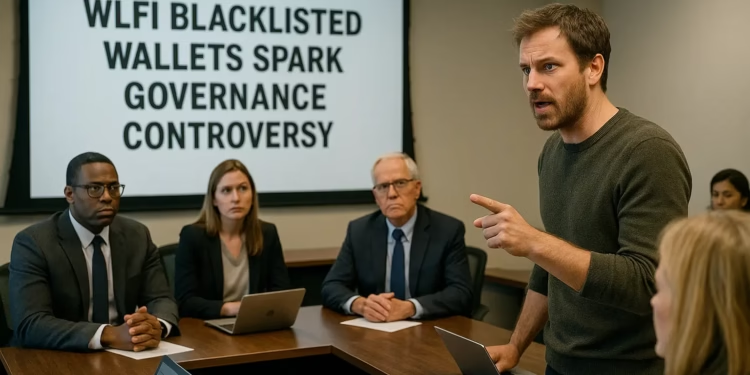World Liberty Financial has blacklisted wallets tied to Tron founder Justin Sun, freezing nearly $595 million in WLFI tokens and igniting a storm over decentralization and governance.
On-chain data shows the WLFI blacklisted wallets were locked after suspicious transfers to Binance, sparking heated debate across the crypto community about market stability and the risks of centralized control in supposedly decentralized projects.
While the WLFI team has not issued a formal explanation, analysts believe the freeze was meant to curb potential sell pressure from Sun’s holdings and restore confidence after WLFI’s volatile launch. The use of WLFI blacklisted wallets has quickly become one of the most contentious governance issues in the project’s short history.
“This is the danger of centralized controls hidden in so-called decentralized projects,” said Alex Svanevik, CEO of blockchain analytics firm Nansen. “Once you have the ability to freeze investor wallets, the entire claim of decentralization comes into question.”
Justin Sun pushes back, denies dumping
Justin Sun rejected the accusations, insisting the transactions were routine tests and wallet management, not market offloading.
“Our address only conducted a few small deposit tests to the exchange, followed by some address splitting,” Sun posted on X. “There was no buying or selling involved, and it could not have had any market impact.”
In another statement, Sun argued that the WLFI blacklisted wallets decision was unjustified and undermined the project’s credibility. “As one of the early investors, I joined together with everyone as we bought in the same way, and we all deserve the same rights,” he wrote.
Sun has been a vocal supporter of WLFI since its launch, investing $30 million in November and holding an estimated $891 million in tokens. Industry trackers like Nansen confirmed there was no on-chain evidence of Sun selling large amounts from his blacklisted wallet, though skeptics allege he could have offloaded tokens indirectly through high-yield programs.
Analysts divided over governance risks
The WLFI blacklisted wallets episode has split the crypto community. Some argue the project was right to intervene to prevent further price instability, while others see it as proof of excessive centralization.
“Blacklisting wallets without a clear governance process creates uncertainty and undermines investor confidence,” said Clara Medici, Senior Analyst at Chainalysis. “Investors need predictability, and arbitrary actions erode that trust.”
Supporters of the WLFI team counter that such measures were necessary after a rocky debut, where undisclosed token supplies and whale movements rattled the market. By freezing Sun’s wallet, they argue, the team prevented larger sell-offs that could have deepened losses for retail participants.
Still, the optics of WLFI blacklisted wallets raise concerns about how much control insiders have over the protocol. For a project marketed as decentralized, the ability to blacklist a major investor sets a precedent that could discourage institutional adoption.
Market impact and next steps
WLFI’s market performance reflects the uncertainty. The token launched with fanfare earlier this week, briefly peaking at $0.32 before sliding below $0.18 which is a 17.9% weekly decline. Despite a 47 million token burn designed to reduce supply, investor sentiment remains shaky.
“The buyback-and-burn program is a step in the right direction,” said Marcus Sotiriou, Market Analyst at GlobalBlock. “But the controversy around WLFI blacklisted wallets overshadows those efforts and puts governance under a microscope.”
Looking ahead, World Liberty Financial faces pressure to clarify its governance structure and provide transparency on when and how blacklisting can be used. Without such clarity, critics warn that fears of arbitrary intervention could suppress demand, regardless of buybacks or token burns.
For crypto investors weighing exposure, the case of WLFI blacklisted wallets highlights the importance of evaluating not just tokenomics, but also governance safeguards. As Sun himself warned, actions perceived as unfair could undermine the project’s long-term credibility no matter how strong the political backing or market hype.











